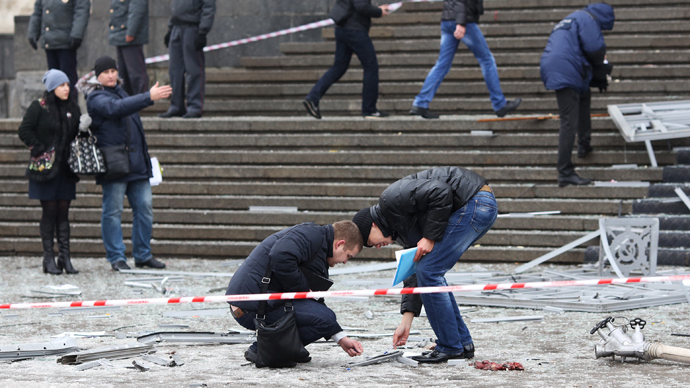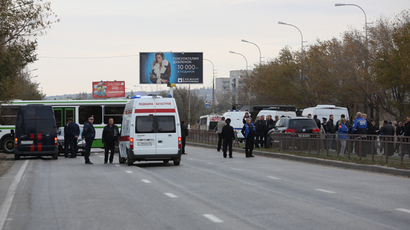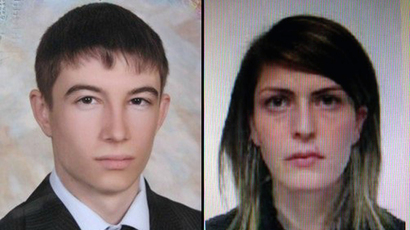Policeman dies shielding others in Volgograd suicide blast

A Volgograd policeman sacrificed his life shielding people from a suicide bomber's deadly blast at the city's train station. The officer was approaching the killer who then detonated the bomb.
At least 17 people were killed in a terrorist attack in Volgograd, a city in South Russia on Sunday. Forty-four people were injured, 38 of whom were hospitalized, including a nine-year-old girl.
The blast went off between the main entrance and the turnstile on the railway station’s ground floor at 12:45 MSK (08:45 GMT).
A suicide bomber, who tried to enter the station, set off the explosive device when near the metal detectors, according to witnesses.
One of the policemen, later identified by media as Dmitry
Makovkin, spotted the suspicious woman and tried to prevent the
terrorist attack, eyewitnesses said.
“At first, she hesitated at the turnstile,” a source within
the investigation told Komsomolskaya Pravda newspaper.
“Dmitry Makovkin approached her and at that movement she
suddenly started to rush inside. Dmitry crossed her path and it
seems he covered her with his body. That’s when she blew herself
up.”
“It was a very powerful blast,” the source added.
“Dmitry died instantly. Three of his colleagues were injured
and are currently in hospital.”
A security service member who was on duty at the train station also died in the terror bombing, according to the Interior Ministry.
The late Dmitry Makovkin, 29, had been working as a policeman for five years, switching to the transport police only this August. The officer had a perfect service record and was praised by his supervisors on numerous occasions.

The professional actions of the Volgograd police minimized the
number of casualties during the attack, Vladimir Markin of the
Investigative Committee, stressed.
“The blast was carried out by a suicide bomber, who saw a
policeman as she came up to the metal detectors, lost her nerve
and detonated an explosive device, which was stuffed with strike
elements,” Markin is cited as saying by ITAR-TASS.
According to preliminary estimations, the explosive device was
equivalent to at least 10 kg of TNT, he said.
“Apparently, the number of victims could’ve been much higher if
not for the so-called ‘barrage system,’ which prevented the
terrorist from making it through the metal detector frames into
the waiting area, where there was a large concentration of
passengers due to a delay of three trains,” the
Investigative Committee spokesman stressed.
The investigation has collected the remains of the alleged
suicide bomber, which will help identify her after DNA testing,
he added.
The shockwave from the blast smashed doors and windows in the
building – “not only those facing the square in front of the
station, but also those facing the platforms,” the local
Vsyo Dlya Vas newspaper reports.
The train station’s main gates were completely wrecked in the
attack, with the blast shaking not only the station itself, but
the square in front of it as well, locals said.
The terrorist attack occurred half an hour before the arrival of a train from Moscow. The first two shockwaves from the blast smashed the doors and windows of the station, with the third one moving upwards. The fire started immediately after the explosion, the Investigative Committee said.
Woman shelters 9-year-old daughter from explosion, dies instantly
There are also reports that a woman inside the station gave her
life to save her 9-year-old child during from explosion.
“The mother managed to cover the child with her body and was torn
apart by the blast. The girl is now in hospital in critical
condition,” Irian Guseva, Volgograd’s mayor, said.
The mayor also said that taxi drivers in front of the station went to assist the victims of the attack: “they drove, those with grave injuries to hospitals” before ambulances arrived, helping save lives.
Another woman at Volgograd train station also put a child’s safety ahead of her own. Both the woman and the child avoided injury.
“I was with a child not far from where the blast
happened,” eyewitness Nadezhda told RT. “I saw the blast
and shattered glass flying. I pushed the child to the floor and
covered him with my body. Then I picked him and we ran.”
Glass from shattered doors and windows posed a serious threat for
those at the train station, one woman told RT.
“We were drinking coffee. There was an explosion. I was lucky to
be wearing a hood; it saved me from all the shattered glass. We
heard screams. My coat is still covered with blood,”
Lyudmila told RT.
Flash, door smashed, panic – eyewitnesses recount blast scenes
One of the eyewitnesses, Svetlana Demchenko, said that the
explosion at the Volgograd train station was so strong that she
“was blinded and fell down.”
"My friend and I came to the station to pick up our friends.
We passed through the metal frame and approached the conveyor
where the luggage is inspected. We were standing in front of the
call board when the blast went off behind us. The flash was very
strong,” she told the ITAR-TASS news agency.

Mikhail, who was injured in the blast, described his experience to RT. “I bent down to collect my documents when I saw a flash of light, and there was a blast. I was thrown back by the explosion. When I came to my senses, a man was carrying me out. Only outside was I able to get a breath of air and started to understand what was happening.”
People inside the train station during the attack were shocked by what they heard. “I was inside in the waiting hall. I heard an explosion and I didn’t realize what had happened. And I saw a giant entrance door completely ruined and people were coming out with their hands and bodies burnt,” another eyewitness said.
Valentina Petrichenko, who works in a kiosk at the station, said
that the building was “rocked by a horrible blast.”
“It was obvious that people were scared – some ran and some were
simply blown over by the blast. Police started coming from
everywhere, ambulances and fire fighting trucks also arrived. It
was very fast. I saw people lying on the stairs at the entrance
as the door was smashed by the blast,” she told the Rossiya
24 channel.
Volgograd lies around 500 kilometers from Russia's volatile North
Caucasus region.
Why Volgograd, why now?
It’s the second terrorist attack the city on the Volga River has
seen in 2013. In October, a suicide bomber blew herself up on a
bus, killing six people and injuring more than 30 others.
Political analyst, Sergey Strokan, of Russia's Kommersant
newspaper told RT that it’s no coincidence that the terrorists
have been targetting Volgograd.
“If you just look at the map and see where Volgograd is, you
will understand the logic of the terrorists. It’s not far from
Sochi. And probably the reason is the Sochi Olympic Games. The
basic idea was to test the authorities and the effectiveness of
security sources,” he said.
Volgograd, formerly called Stalingrad, was the scene of one of
the major battles against the Nazi German forces in 1942-43,
which became one of the cornerstones in the Russian victory
against the invaders.
“But it’s not only Sochi that determines Volgograd as a
target. Few people in the world know, but we Russians know that
Volgograd (Stalingrad) is a sacred place. If you recall the
history of Russia during World War II, you’ll see that this is
the place, which in the history books stands as an indelible
monument to the unconquerable spirit of the Soviet-Russian
people. And, probably, today's terrorists are trying to show that
those symbols are irrelevant now. This is very cynical logic but
it's what we’ve seen today in Volgograd,” Strokan added.














